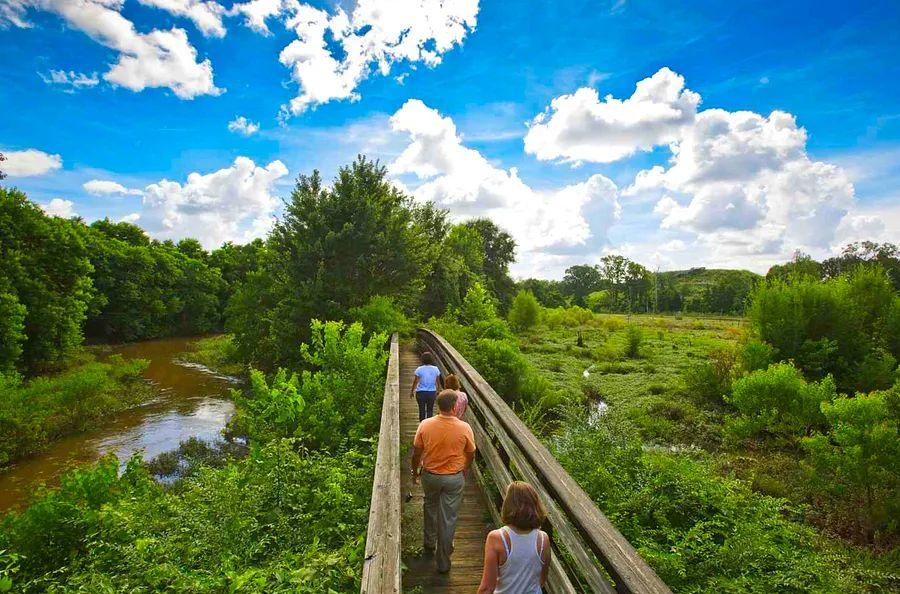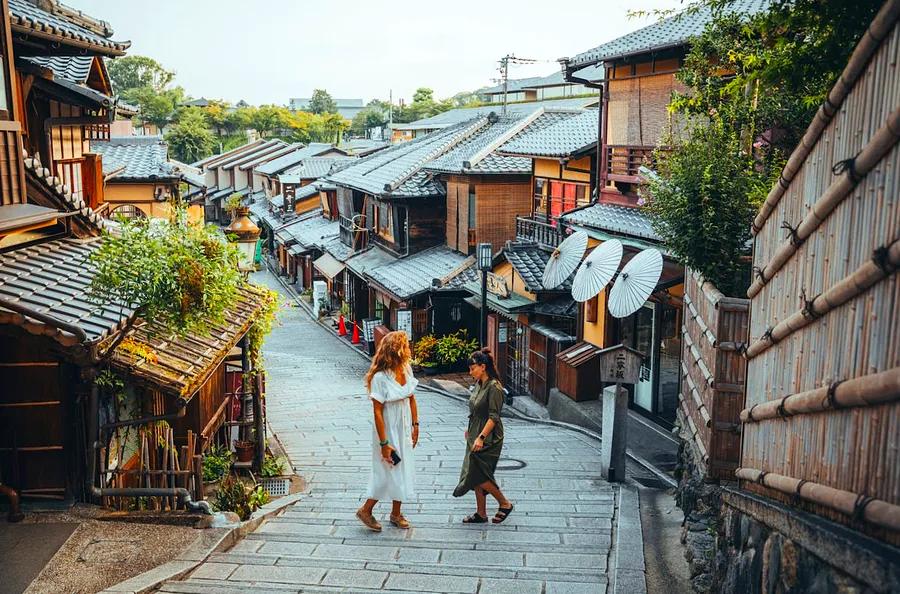Georgia might soon see the establishment of its first national park, offering more than just picturesque hiking paths.

Named after the phrase meaning “boiling waters,” Ocmulgee Mounds National Historical Park in Georgia boasts a history spanning over 12,000 years, featuring Indigenous earthen mounds used for burial and ceremonial purposes. It is currently under consideration for national park designation with an expanded footprint.
“This served as the capital for the Creek Confederacy,” states Tracie Revis, a Muscogee (Creek) Nation member and director of advocacy for the Ocmulgee National Park and Preserve Initiative (ONPPI). “The Federal Road, the trade route, passed through here below the Fall Line — this was truly the heart of it all.”
The park is profoundly significant to the Muscogee (Creek) people, including Revis, whose ancestors inhabited this area before their forced relocation to Oklahoma on the Trail of Tears. The tribal capital, Okmulgee, pays homage to this Georgia location.
Since 1936, the Ocmulgee Mounds have enjoyed protection, when President Franklin Delano Roosevelt designated 678 acres under the Antiquities Act. It was also the site of the largest archaeological excavation in American history, revealing artifacts from early settlement days, many of which are now displayed in the park’s museum.
If Congress grants the new designation, Ocmulgee Mounds will become the first national park in the U.S. to be co-managed by a displaced tribe. Discover for yourself what makes this landscape, recognized as one of the top destinations for 2024, truly special.
 Explore Georgia
Explore GeorgiaYour Visit: What to Know
Currently spanning over 600 acres, Ocmulgee Mounds National Historical Park has been expanded through land acquisitions from the city of Macon and other entities. Future estimates suggest it may encompass over 2,000 acres, including hunting grounds along the Ocmulgee River. Notably, there is no entry fee to access this park, unlike many others.
Getting There
Macon, Georgia, is roughly a two-hour drive south of Atlanta via Highway I-75. While driving is the most convenient option, there are alternatives available. For instance, Greyhound offers bus service between the two cities. Upon arrival at the Macon bus station on 5th Street, you can easily catch a taxi or use a ride-sharing service to reach Ocmulgee Mounds, which should take under 10 minutes.
Optimal Visiting Times
 Discover Georgia
Discover GeorgiaMacon experiences a humid subtropical climate, leading to temperature fluctuations throughout the year. Winter averages are typically in the 40s, with occasional snowfall at Ocmulgee Mounds National Historical Park. Summers can bring highs that feel like 100 degrees due to humidity, so checking the forecast is essential before heading out for a hike.
Spring is the prime season to visit, as temperatures are pleasant, though sudden storms and flooding may occur. Always verify conditions prior to your trip. Another fantastic time to visit is during the annual Ocmulgee Indigenous Celebration in September, featuring dances, crafts, and educational talks. The Lantern Light Tours in March add an enchanting experience for nighttime visits.
Top Activities at Ocmulgee
Ocmulgee Mounds National Historical Park offers several trails, but its uniqueness lies in the insight it provides into the Indigenous peoples who inhabited this area thousands of years ago.
 Discover Georgia
Discover GeorgiaStep Inside the Earth Lodge.
The Earth Lodge is a reconstruction of the council chamber that played a crucial role in Mississippian culture, originating around 1015 A.D.
“This is where various tribal towns along the river would gather. They would convene here to discuss whether to go to war or determine their next steps,” explains Revis. “The ground floor here is the original.”
Keep in mind that this area is not wheelchair accessible, and the entrance is quite narrow, requiring taller visitors to duck to enter.
 Discover Georgia
Discover GeorgiaVisit the museum to view artifacts from the archaeological excavation.
Between 1933 and 1936, various agencies, including the Civilian Conservation Corps and Works Progress Administration, collaborated to uncover historic items at the site under the guidance of Dr. Arthur R. Kelly from the Smithsonian Institute. Over 2.5 million artifacts were recovered, including bones, pottery, arrowheads, and jewelry.
Many of these artifacts are now showcased in the on-site museum, alongside photographs of the Muscogee (Creek) people. Revis even discovered family photos, including a large picture of her aunt, who has long been dedicated to sharing their stories and preserving their culture in Georgia.
Ascend to the summit of the Great Temple Mound.
While climbing on most mounds is generally discouraged, this area features stairs that allow you to rise above the landscape and enjoy stunning views. It includes the two tallest mounds in the park, built by the Mississippian people around the 10th century C.E. using river clay.
Essential Wildlife and Natural Attractions
 Discover Georgia
Discover GeorgiaOcmulgee Mounds National Historical Park is located by the river wetlands, where much of the flora and fauna thrive. Visitors can expect to see a diverse range of wildlife, including alligators, river otters, deer, and egrets.
The park is also the habitat of the Ocmulgee shiner, a fish species unique to the state. Fishing is permitted along the riverbanks, as well as at Walnut Creek and Clay Pond.
Top Accommodation Options
 Image courtesy of Marriott
Image courtesy of MarriottHotel Forty Five, A Tribute Portfolio Hotel
Currently, there is no accommodation within the park, but downtown Macon is just a short drive away. Hotel Forty Five derives its name from the angle of its art deco building at the intersection. The interior celebrates Macon’s rich music heritage, featuring photographs and art inspired by legends like Otis Redding. It also boasts a coffee shop for your morning boost, along with a restaurant and rooftop bar.
The Woodward Hotel
The Woodward Hotel draws inspiration from writers and is named after the owner’s grandfather, a celebrated author and professor. Each room and suite features Southern literature, designed in unique styles, and the cocktail bar, Quill, offers a cozy spot for a nightcap. We recommend trying The Heart Is a Lonely Hunter, a bourbon and black tea drink named after Carson McCullers’ acclaimed novel.
Macon Marriott City Center
The Macon Marriott City Center is the nearest hotel to the Ocmulgee Mounds entrance, situated across the river from downtown. It offers all the typical amenities of a convention center hotel, including an indoor pool, fitness center, and restaurant. Additionally, the rooms are pet-friendly for an extra fee.
Best Places to Eat
 Courtesy of Macon Bagels
Courtesy of Macon BagelsWhile Ocmulgee Mounds doesn’t have an on-site restaurant yet, downtown Macon boasts a wide variety of dining options.
Start your day with breakfast from Macon Bagels, perfect for enjoying at the park. They serve a variety of bagels with delicious spreads, along with coffee and sandwiches. If you have time, don’t miss H&H Soul Food, a must-visit in Macon. This spot was a favorite of The Allman Brothers Band before they hit it big. You’ll gladly pay for their famous fried chicken biscuit!
Located right by the park entrance, Nu-Way Weiners has been a beloved Macon eatery for over a century, famous for its chili dogs, burgers, and classic chocolate malts. They also serve breakfast. Another must-try is Rookery, known for its quirky burgers inspired by Georgia's local flavors.

1

2

3

4

5
Evaluation :
5/5